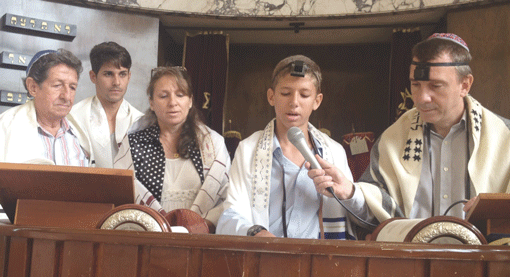Community has been aided by revitalization project from JDC
By MICHAEL A. APPLEMAN
The Cuban Jewish community survives – and thrives under Raul Castro. In nearly 10 years of humanitarian work in Havana, I was thrilled in November to receive an aliya at the Bar Mitzva of Abel Ashkanazi. Abel is the son of Ella Ashkanazi, director of the Hebrew School at Bet Shalom (the Patronato). This last minute Bar Mitzva invitation was given while I was recently delivering donated clothing as well as ink jets for the synagogue’s printers (nonfunctional for six months!).
The history of Cuban Jews is complex. Many European Jews migrated to Cuba before World War II — and some, during the Holocaust, when denied entry by the United States. The community was thriving, with 15,000 Jews before the 1959 Castro Revolution. From 1959 through approximately 1990 religion was prohibited.

-
The Bar Mitzva of Abel Ashkanazi, second from right, was attended by Michael A. Appleman during his 20th mission to Cuba. (Photo: Courtesy of Michael Appleman)
Castro attempted to annihilate Judaism. But, after a visit from the Pope, and an amendment to the Cuban Constitution, religious practices were restored. Now there are 1,500 Jews, under a revitalization project from the Joint Distribution Committee (JDC), the largest Jewish philanthropic agency in the world.
The JDC has impacted Judaic practices dramatically since 1990. With an infusion of $300,000 to restore the Bet Shalom synagogue and hundreds of thousands of dollars later, the community has a vibrant Jewish day school educational programs, Jewish camps and celebratory holiday events. Abel Ashkanazi’s Bar Mitzva was the prototype and manifestation of the JDC’s success.
Ten years ago, during my first visit and first aliya at Bet Shalom, the Cuban Jews did not have the skill to read directly from the Torah. That is, reading was from a Tikun, placed next to the scroll. But now, Abel and his mother, Ella, chanted beautifully from the Torah itself — sending shivers, down my back. The Cubans can read Torah with no notes, vowels or punctuation! Unimaginable!
A few years ago, Beth El Synagogue of Minneapolis had donated Cantor Newman’s Torah reading texts, tapes and CDS. The influence of such donations is warmly astonishing. These materials, as well as the JDC leadership by Jewish Argentinean clergy has revitalized a community that nearly perished over 50 years ago.
Each humanitarian visit to Cuba has a stunning impact — a reminder of Castro’s tyrannical suppression of rights. Visiting a dictatorial, totalitarian country — where freedom of speech, press, assembly are daily usurped — enhances one’s pride as an American.
Cuban political activists are routinely arrested. A nurse friend, who lived in one Cuban province, but illegally worked in another province, is jailed for five days — akin to being incarcerated for living in Minnesota, but working in Wisconsin.
A journalist who publishes about a recent outbreak in cholera is thrown in prison. Four years ago, I was detained for nine hours and threatened by customs for traveling with a suitcase with medicines for Jewbans from Minneapolis physicians of allergy, internal medicine, and dermatology.
Cuban rights under Raul Castro are no better than under Fidel Castro — if not worse. Per capita income is under $25 per month — less than a dollar a day. Engineers and other professionals work as taxi drivers or hotel clerks, dependent on tourist tips.
And then there is the plight of Jewish-American prisoner Alan Gross, who was sentenced in 2009 to 15 years in prison for spying and bringing satellite telecommunications to the Cubans (Cubans do not have internet access — only tourists, governmental officials, and some professionals can go online).
Gross professed his innocence, protesting that he was bringing computers to the Jewish community — but the Jews denied that at trial. Gross has lost 100 pounds in jail. His mother has lung cancer and his daughter has breast cancer. Cuba denied his visit to see them in the U.S. The U.S. has denied a quid pro quo — an exchange of five Cuban prisoners for one Alan Gross. His incarceration remains a major impediment and stumbling block to eradicating the embargo.
Please visit Cuba on a humanitarian, cultural or people-to-people tour. Witness the amazing, colorful art, which can be imported back legally — as an exception to the embargo. Dance to Cuban music. Support and love the Cuban people-they want and need it!
I have been detained — but not deterred. Humanitarian work for the Jewish community continues to be on the horizon.
***
Michael Appleman, Ph.D., led a mission from Beth El in 2009 and sponsored an art auction at the synagogue in 2011. He recently opened Cubano Gallery in Golden Valley, supporting Cuban artists and humanitarian work.
(American Jewish World, 12.20.13)




















